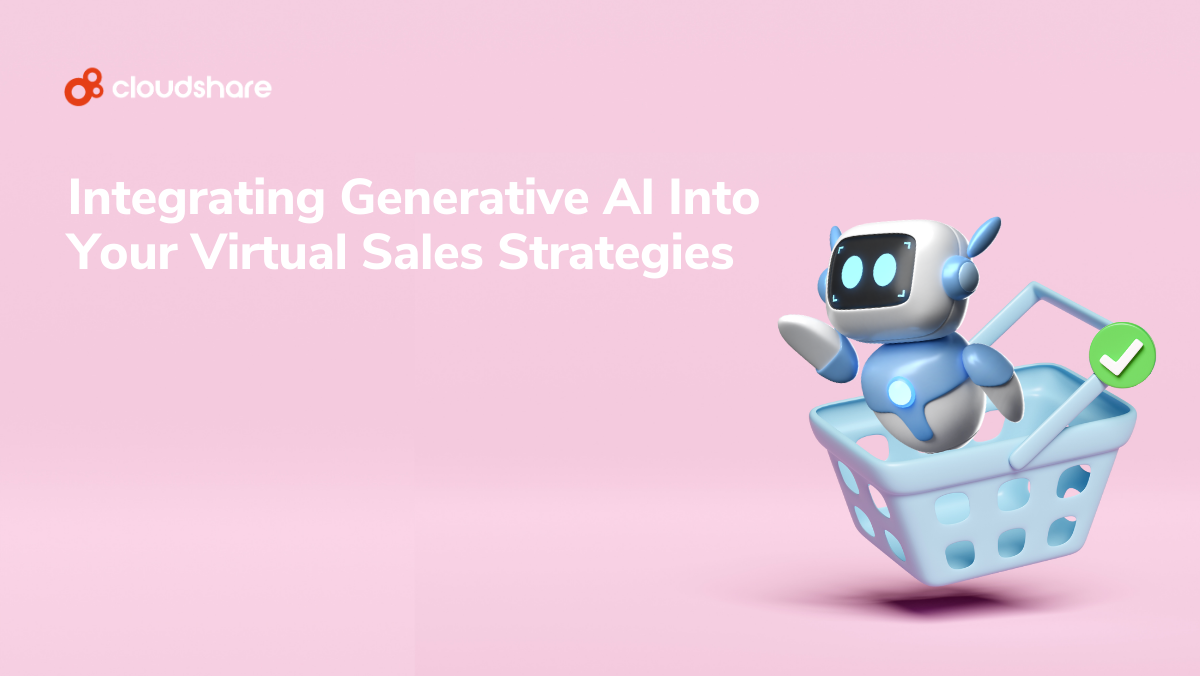
It’s been a little over a year since OpenAI first launched ChatGPT. It’s almost mind-bending to think about how much has changed in the short time since. Today, generative AI is widely regarded as one of the most disruptive technologies of the current millennium — perhaps one of the most disruptive technologies in human history.
As of today, Google, Meta, and Microsoft have all launched their own generative AI tools. According to the EY CEO Outlook Pulse 2023, 84% of CEOs are accelerating generative AI investments in order to maintain a competitive advantage. And McKinsey predicts that generative AI could add as much as $4.4 trillion per year to the global economy.
It’s difficult to name even a single industry or niche that the technology hasn’t impacted in one way or another. That includes our own. Thus far, we’ve talked about how generative AI aligns with customer training, how it can enrich customer training, and the role it plays in corporate learning and development. Today, we’re going to focus on how generative AI can revolutionize your business’s virtual sales strategy.
What is Generative AI, Exactly?
There’s plenty of misinformed hype surrounding generative AI. As such, before we discuss the technology’s role in your virtual sales program, we need to define it. We need to nail down both what it does and what it cannot do.
As the name suggests, generative AI (GenAI) is a new class of artificial intelligence that generates content such as images, text, and video. It’s important to note that GenAI doesn’t actually create anything. Instead, it combines the massive volume of data on which it was trained into novel and contextually relevant content.
GenAI algorithms have no real understanding of the content they manufacture — they’re essentially replicating and combining existing patterns and ideas. For example, an AI image generator is able to produce a painting of a dog because it’s been trained on several hundred thousand — perhaps even several million — pictures of dogs.
It doesn’t actually know what a dog is in the same way a human does. Let’s say, for instance, an image generator is trained on several hundred thousand photos of cats — but it’s informed that they are photos of dogs. A human learner might think to question that assertion.
The GenAI algorithm does not.
For this reason, GenAI has a tendency to provide incorrect information when its training data is biased, incomplete or inaccurate. This is a phenomenon known as hallucination. The AI is either inventing patterns or recognizing patterns that aren’t actually there.
Last year, an attorney in a personal injury lawsuit against Colombian airline Avianca learned this the hard way. When the airline filed a motion to dismiss his client’s case against it, Steven A Schwartz turned to ChatGPT for help. He needed cases that would establish a legal precedent — a means of countering the motion.
Although no such cases existed, ChatGPT cheerily provided him with exactly that. As reported by the New York Times, the AI invented multiple cases, including Martinez v. Delta Air Lines, Zicherman v. Korean Air Lines and Varghese v. South China Air Lines. It continued to insist that the cases were real even after they had been proven demonstrably false.
Schwartz acknowledged in a later affidavit that ChatGPT had “revealed itself to be unreliable.” None of this is to say that GenAI isn’t a revolutionary technology. It still very much has the potential to revolutionize your digital sales strategy. You just need to be aware of the technology’s risks and shortcomings, as well.
5 Ways Generative AI Enhances Virtual Sales
Truthfully, you could probably publish an entire book about all the ways generative AI can improve a business’s sales process. For the sake of brevity, we’re going to narrow it down to a few use cases that we feel are particularly relevant for software companies.
Hyper-Personalization
Arguably, the most compelling aspect of generative AI is its potential to support the creation and distribution of more personalized content. Rather than requiring salespeople to manually tailor content to a prospect, a generative AI tool can work from a template. The sales team still needs to be there to provide human interaction, but AI does most of the heavy lifting when it comes to crafting their messaging.
Decision-Making
Generative AI excels at two things — pattern recognition and parsing massive quantities of data. This makes the technology especially valuable when it comes to big-picture insights on trends, market landscape, and customer behavior. AI can identify invaluable patterns that might otherwise have gone unnoticed, enabling smarter data-driven decisions across the entire organization.
Customer Support
At its core, ChatGPT is essentially a highly sophisticated chatbot. What this means is that the platform and its derivatives can essentially serve as a first point of contact for customer support inquiries. Because it’s so much more advanced than a run-of-the-mill chatbot, ChatGPT can likely handle the majority of straightforward customer support requests, leaving your support team free to focus on the most complicated or highest-priority issues. There’s even the possibility of using GenAI as a sort of virtual sales representative, answering basic questions about your software and its features while your sales team focuses on higher-level inquiries.
Dynamic Training Content
Similar to how AI can generate hyper-personalized sales and marketing collateral, it can also help your organization create dynamic, customized training materials. With most of the low-level manual work taken care of by AI, instructors and course designers can focus their attention on making things more engaging and innovative.
Communication at Scale
Lastly, AI can help support omnichannel selling and communication, allowing even smaller sales teams to scale their messaging and communication across multiple channels and touchpoints. This can be invaluable in helping your business reach customers where they are — even if you aren’t quite there yet.
The Challenge of Ethical AI
No conversation about generative AI would be complete without touching on some of the technology’s ethical issues. For one, it has been alleged that OpenAI stole massive amounts of personal data when training ChatGPT. Meanwhile, Meta — itself no stranger to unethical practices and privacy concerns — made no secret of the fact that it trained its AI on data from both Facebook and Instagram users without their consent.
And then there’s the growing crop of AI image generators, which many have come to believe were trained on stolen artwork.
Suffice it to say, these are all issues you must bear in mind if you intend to use generative AI within your sales strategy. If you intend to use the technology to manage sensitive data, such as the personal information of your customers, you must incorporate and adhere to strict data privacy, security, and integrity standards. We also strongly recommend providing your employees with technical training so that they understand Generative AI.
It’s Time to Embrace a Smarter Virtual Sales Strategy
Generative AI has completely changed the virtual sales landscape, and there’s every indication that what we’ve seen thus far is only the beginning. However you feel about the technology, you need to start exploring it sooner rather than later because it’s not going away anytime soon.
But neither are your salespeople. That’s the mistake many businesses made in the early days of ChatGPT and one that many continue to make. They regard GenAI as a replacement for human expertise when, in reality, the two complement each other.
Artificial intelligence and human intelligence are at their best when working in collaboration rather than in competition. Consequently, GenAI is an incredibly powerful sales enablement tool and should be regarded as such. Don’t let yourself be fooled by the people who insist otherwise — there’s a good chance they’re the same people who insisted Bored Ape NFTs were invaluable assets.
Interested in learning more about how to apply artificial intelligence to customer education? Our Head of Business Development Roy Aaron recently hosted a webinar with computer-based training expert Josh Cavalier on the topic.




